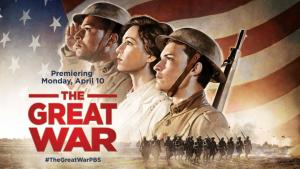March 30, 2017
Dorchester’s John F. Kennedy Presidential Library hosted a preview screening of the new American Experience series, The Great War, on Tuesday evening. The six-hour documentary will be broadcast over three nights beginning on April 10.
 The Great WarIt is the most ambitious American Experience effort in a decade, according to executive producer Mark Samels, one of several experts who spoke about the war and its impacts on the USA.
The Great WarIt is the most ambitious American Experience effort in a decade, according to executive producer Mark Samels, one of several experts who spoke about the war and its impacts on the USA.
April 6 marks the 100th anniversary of the country’s entry into the global conflict that had already raged for three years. But the series is much more than a commemorative document. The Great War— as it was called until a second global conflict unraveled in the 1930s and ‘40s— stands as a defining moment for Americans, particularly as we consider our current moment in time.
“It was a time when we were divided,” Samels said at the library event. “We were debating immigrants; we were debating racism; we were debating the role of women; we were debating who we are as a country. Sound familiar?”
The First World War unleashed events and dynamics that we are still grappling with today, from domestic tensions over gender and racial oppression to the proper role of the United States as a power on the world stage. The monumental mobilization that eventually sent several million American fighting men to the front in France triggered dramatic events at home: race riots and atrocities directed at African Americans; a rush to assimilate as war loomed by the close-to-one-third of Americans who were foreign-born; and, in 1919, a long-deferred realization of women’s suffrage.
Like many of the great documentaries crafted here in Boston at WGBH-TV, “The Great War” presents an opportunity for viewers to dive deep into a pivotal moment in our national history, one that is little known and even less understood. It is a fitting reminder of why such programming— itself now under threat of funding cuts from the individual who warms Woodrow Wilson’s old chair— should be preserved, treasured and — most importantly— watched.
– Bill Forry


